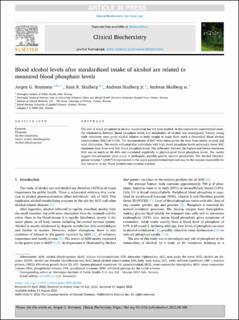Blood alcohol levels after standardized intake of alcohol are related to measured blood phosphate levels
Peer reviewed, Journal article
Accepted version

View/
Date
2022Metadata
Show full item recordCollections
Abstract
The role of blood phosphate in alcohol metabolism has not been studied. In this explorative experimental study, the relationship between blood phosphate levels and metabolism of alcohol was investigated. Twenty young male volunteers were given alcohol relative to body weight to make them reach a theoretical blood alcohol concentration (BAC) of 0.12%. Ten measurements of BAC were taken across the time from intake, to peak and total elimination. The results indicated that individuals with high blood phosphate levels achieved a lower BAC maximum than those with low blood phosphate levels. The difference between the highest and lowest maximum BAC was as much as 30–40% and correlated negatively to physiological blood phosphate levels. The results suggest that phosphate plays a role in prehepatic, possibly gastric, alcohol metabolism. The Alcohol Dehydrogenase enzyme 7 (ADH7) is represented in the upper gastrointestinal tract and may be the enzyme responsible for this variation in the blood alcohol concentration reached.
